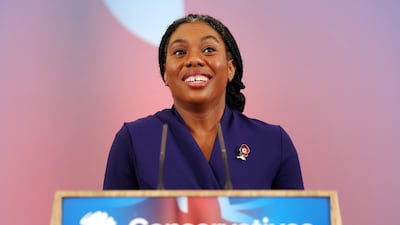There’s good news from the UK this week. Two of the key players in British politics right now are women, and one is of Nigerian heritage. Either of these successful women could be on course to become British prime minister one day.
Kemi Badenoch, born in the UK of Nigerian parents, is the new leader of the Conservatives. She was voted in by party members after a series of failures from Boris Johnsonto Liz Truss and Rishi Sunak. Ms Badenoch is the first black leader of a major political party in British history. In quick succession, the Conservatives have had a leader of Asian background, Mr Sunak, and now one of African background.
The other key politician is Labour’s Rachel Reeves. She is the first female British Chancellor of the Exchequer. That’s a finance minister role that goes back 800 years. Ms Reeves is making her own history. Last week, she produced a budget that sets the course for the Labour government for five years and possibly a decade.
Whatever your politics, citizens of the UK should at least take a moment to be proud that our ancient – and some (including me) say antiquated – democracy is capable of embracing change and diversity. At last.

Since the office of prime minister was created in the year 1721, 58 people have served in Downing Street. But 55 of them were men. A third (20) went to one (very posh) school, Eton. Half (31) went to the same university, Oxford.
Deepening the leadership talent pool is clearly a good idea. And Ms Badenoch began by offering a welcome critique of her own Conservative party: “Our party is critical to the success of country, but to be heard, we have to be honest,” she said. “Honest about the fact that we made mistakes. Honest about the fact that we let standards slip. The time has come to tell the truth.”
Honesty? Truth? Diversity? Is there no end to this good news? Well, there is bad news, too.
The under-reported story is the collapse in the numbers of Conservative members creating an existential problem for the party whoever leads it. Conservatives, as the July general election showed, are very unpopular with voters. Worse, the party has seen a staggering collapse in its own membership.
During the 1950s, there were 2.8 million members of the party. Just before the general election in July, membership had dropped to just 172,000. By last Saturday’s leadership vote, that dismal figure had fallen further. Only 131,680 party members were said to be eligible to vote. That’s a fall of about a quarter. And – worse – only 95,000 of the 131,680 were interested enough actually to vote. Ms Badenoch scraped home with 53,806 votes. Her rival Robert Jenrick took 41,388.
Think what these numbers must mean for a party that used to claim that it was historically the most successful democratic political organisation anywhere. For a sense of perspective, the National Trust, which looks after landmark castles, stately homes and beautiful parts of the British countryside, has 100 times as many members (5.38 million) as the party that seeks to govern under Ms Badenoch.
And the existential threat for Ms Badenoch’s Conservatives is that they have been outflanked on the political right by Nigel Farage’s Reform UK party and angered or disappointed more middle-of-the road “One Nation” Conservatives. The alienation began with Brexit and through former prime minister Boris Johnson’s expulsion of these members, including some really talented MPs.
Ms Badenoch, moreover, has made a reputation for herself as a “culture warrior”. She goes on about issues that make tabloid headlines and divide people in Britain, with echoes of the way former US president Donald Trump and other right-wing leaders stir up some voters but irritate others.
As one British culture war-supporting newspaper put it: “Her forthright views on issues from gender identity to institutional racism have thrilled supporters on the right while outraging critics on the left in equal measure.”
The truth is that Labour won a landslide in this year’s general election by avoiding culture wars as much as possible. Instead, it focused on issues that affect everyone’s lives – the economy, jobs, interest rates, housing, health, schools and transport.
And that brings us back to Ms Reeves.
The key question for voters around the world is always the same. Are things getting better for you, or have they been getting worse? If Ms Reeves through her budget, and in very difficult economic times, can turn the public sector in the country around, create jobs and get sick people the medical treatments they need, then Labour may be on course for more than five years in power.
If Ms Badenoch understands that the kind of rhetoric that persuades a tiny handful of Conservative members to make her leader of their party is not the kind of divisive speech that the other 68 million citizens particularly warm to, then maybe she really will have a chance of becoming prime minister.
If, on the other hand, the endless culture war rhetoric of division continues under her leadership, so will the decline of the Conservative party.


